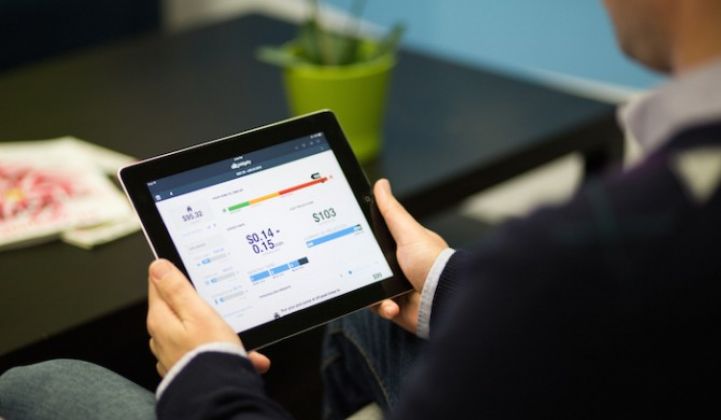Bidgely, the startup that combines energy disaggregation technology with utility customer connectivity, has raised a $27 million Series C round to help it serve more than 10 million homes with a blend of efficiency reports, energy usage alerts, and home energy audits.
Tuesday’s round is the largest yet for the Mountain View, California-based startup, and was led by Georgian Partners, along with previous investors Innogy, E.ON and Khosla Ventures. Previous investor Constellation Technology Ventures, the venture arm of U.S. utility holding company Exelon, is “expected to return” to add investment to the oversubscribed round, according to Tuesday’s press release.
Bidgely previously raised $3 million from Khosla Ventures in 2012, and a $16.6 million Series B round in 2016. The Series B was led by Constellation Technology Ventures and joined by German utilities E.ON and innogy, with Khosla Ventures also participating. Tuesday’s round brings total investment in the company to $51 million.
The size of the new round is commensurate with the growth Bidgely is undergoing, CEO Abhay Gupta noted in an interview. The company now has 125 employees, with more than 25 utility customers in 10 countries using its software, he noted.
“We are now selling to the top utilities around the country, as well as around the world,” he said.
This summer, Bidgely surpassed 2 million U.S. homes being served with its mobile energy alerting and efficiency assessment mobile platform, including Nevada utility NV Energy.
The company has more than 10 million homes “under contract,” which includes an alerting system contract with Duke Energy. It also includes home auditing services for a U.S. investor-owned utility with more than 1 million homes, as well as a contract with Canadian utility London Hydro.
In Europe, German utility RWE (innogy) pledged to roll out Bidgely’s HomeBeat mobile application to millions of its retail customers in 2016, while Australian utility United Energy tapped its capabilities to achieve up to 30 percent reductions in home energy usage for demand response. Japanese utility Chubu Electric Power and utilities in New Zealand have also announced plans to use Bidgely's software.
Bidgely’s energy disaggregation technology is at the heart of all its customer and utility-facing applications, Gupta said. The technology is capable of itemizing energy consumption down to the household system and appliance level, using only data collected from hourly or 15-minute smart meter data. Last summer, Bidgely expanded to homes without smart meters, performing analyses based on monthly billing information, data collected from multiple sources, and its own store of billions of data points.
Bidgely’s approach is one of many kinds of disaggregation technologies that use different methods and achieve different degrees of accuracy. Some use sensors within homes to analyze the unique energy-use patterns of individual devices, providing more pinpoint accuracy than Bidgely’s system.
But Bidgely’s approach provides far more insights than common utility energy-efficiency auditing or alert systems, Gupta said.
“When we send messages based on disaggregation, they’re personalized,” he said. "At Duke Energy, we would send an alert saying, 'You are looking at your end-of-the-month bill for approximately this much, and here’s your average compared to your neighbors,'” much like Opower and other home efficiency programs do. But, he added, “We also tell them where they’ve spent their money -- this much in AC, this much in heating, this much in refrigerator, and on and on.”
Disaggregation data informs every step of the Bidgely communication with customers, he said. For example, Bidgely smooths the process of getting customers to sign up for home energy audit programs, which is a major expense for most utility efficiency programs, according to Gupta.
“In the traditional home energy audit solution, the customer goes online and has to fill in 15 to 20 questions -- and most people drop off after four to five questions.” With Bidgely’s platform, by contrast, “the end user has to answer zero questions, because we are able to give a far better breakdown of your energy bill,” and then the system can use its data to fill in most of the blanks.
As for utility applications, Bidgely can pinpoint which home has the most inefficient pump, which home has the most inefficient air-conditioning compressor, "and further, whether you’re running the air conditioner too many hours, which means you should buy a smart thermostat, or whether your air conditioner is using too much power," explained Gupta.
Different utilities are leaning on Bidgely to serve different needs, he said. In Europe, Australia and New Zealand, where utilities are free to chase and steal customers from each other under deregulated energy markets, the key drivers are reducing customer churn through the app and finding new products and services to offer those customers to expand their revenue streams, Gupta noted.




